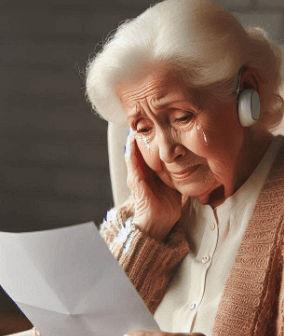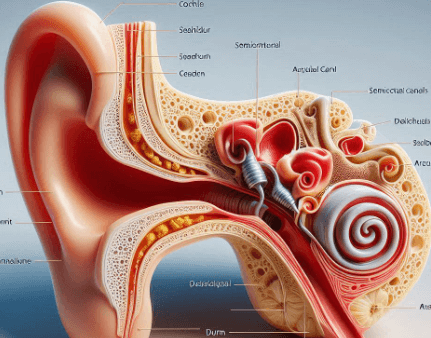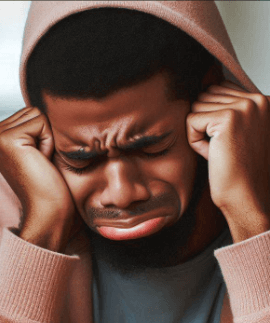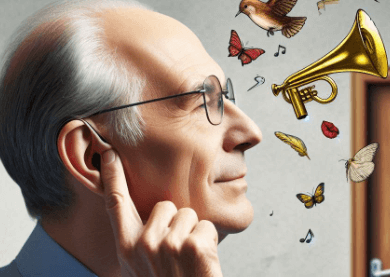Welcome to today’s article where we are going to talk about hearing loss affecting the elderly.
Presbycusis, also known as age-related hearing loss, is super common among older adults.
It usually starts around the age of 60 and it’s a gradual loss, so it might sneak up on you without any warning. But knowing what’s happening can make a huge difference in managing it.
Presbycusis happens due to changes in the inner ear, the middle ear, or sometimes the nerve pathways that go to the brain.
Think of it like this: parts of your hearing system are just wearing out a bit. This type of hearing loss is usually permanent, but there are ways to make life easier.
The main symptoms of presbycusis include difficulty hearing high-pitched sounds, trouble following conversations in noisy places, and often, voices might sound muffled. It’s like trying to listen to someone with earplugs in – super frustrating, right?
One of the first things you might notice is that higher-pitched noises, like children’s voices or the chirping of birds, become harder to hear.
Eventually, even normal conversations may become challenging. If you’re constantly asking people to repeat themselves or cranking up the volume on the TV, it might be time to check your hearing.
Getting a diagnosis isn’t as scary as it sounds. Usually, it starts with a visit to your doctor, who can refer you to a specialist called an audiologist. The audiologist will run a bunch of hearing tests to see where your hearing sits. It’s painless and can help develop a plan to tackle the hearing loss. Here is an article I wrote on how you can read your hearing test results.
Recognizing presbycusis and knowing its symptoms can help you or your loved ones take proactive steps. It’s all about being aware and getting the right support.
Recognizing Hearing Loss in the Elderly
Recognizing hearing loss in elderly individuals could sometimes be tricky since it happens gradually.

You might realize you’re having to repeat things more often, or maybe they’re turning up the TV louder than usual. These subtle signs can hint at hearing loss.
One of the most common indicators includes frequently asking others to speak more slowly, clearly, and loudly.
When someone starts saying “What?” a lot, it’s a good sign to pay attention to. Other signs include missing parts of conversations, especially in noisy environments, or feeling tired and stressed after trying to keep up with conversations. It’s exhausting trying to fill in the blanks all the time.
Anecdotes and real-life examples highlight these struggles.
For instance, you might notice that grandma stops participating in family dinners because it’s too much of a hassle to keep up with the chat. Grandpa may start to avoid phone calls because it’s hard to hear the person on the other end. Simple, everyday scenarios like these can be big red flags.
Statistics can also shed light on this issue.
According to the National Institute on Deafness and Other Communication Disorders (NIDCD), roughly one in three people in the United States between the ages of 65 and 74 has hearing loss.
That number jumps to nearly half for those older than 75. This shows how common it is and emphasizes the importance of staying alert to the signs.
Picking up on these signs early can make a huge difference. Encourage your loved ones to get their hearing checked regularly. Early detection means better management, and potentially slowing down the progression of hearing loss. It’s all about staying proactive.
Recommended Reading: Hearing Loss and Children, Is There a Connection
Different Types of Hearing Loss in the Elderly
Understanding the different types of hearing loss in elderly individuals is crucial because it helps tailor the right treatment.

There are primarily three types: conductive, sensorineural, and mixed hearing loss. Each has different causes and requires specific approaches.
Conductive hearing loss often arises from problems in the outer or middle ear. Think of it as a blockage or mechanical issue. Common culprits include ear infections, fluid buildup, or impacted earwax. In many cases, this type of hearing loss can be temporary or reversible with treatment, like medication or minor surgery.
Sensorineural hearing loss is more about inner ear or nerve damage. This type is permanent and typically associated with aging or prolonged exposure to loud noises.
Imagine the tiny hair cells in your inner ear, which are essential for hearing, getting damaged over time or due to constant loud noise.
Unfortunately, once these cells are damaged, they can’t be restored. Treatments usually involve hearing aids or cochlear implants to help manage the condition.
Mixed hearing loss is a combination of both conductive and sensorineural factors.
It means there are issues in both the outer/middle ear and the inner ear/nerves. Addressing mixed hearing loss involves tackling the conductive part with medical treatments while managing the sensorineural part with hearing devices.
Grasping these types helps in understanding why tailored approaches are necessary.
For example, if Aunt Jane has conductive hearing loss, removing excess earwax or treating an infection might restore her hearing. But if Uncle Bob has sensorineural hearing loss, hearing aids could significantly improve his quality of life.
Causes of Hearing Loss in the Elderly
Understanding what causes hearing loss in elderly folks can shed light on prevention and management.
Several key factors contribute to this condition, and it’s worth noting each to tailor strategies effectively.

Heredity is a big player.
If your family has a history of hearing loss, there’s a higher chance you might experience it too. You can’t change your genes, but knowing your family history can help you stay proactive about your hearing health.
Exposure to loud noises over time is another huge cause.
Think about those who’ve worked in noisy environments like construction or factories or even those who love cranking up their music. Consistent loud noise exposure can damage the delicate structures in your ears, leading to permanent hearing loss. Using ear protection in loud environments is a no-brainer for prevention. Check out some of the best ear protection ear muffs here.
Medical conditions and medications play a significant role as well.
Diseases like diabetes and hypertension can affect blood flow to the ear, causing hearing issues.
Some medications, known as ototoxic drugs, can damage the inner ear, leading to hearing loss. For example, certain chemotherapy drugs and antibiotics can have this side effect. Always discuss potential side effects with your doctor when starting new medications.
Age-related changes are another inevitable cause.
As you age, changes occur in the ear structures, such as thinning of the eardrum or loss of hair cells in the inner ear, leading to presbycusis. Regular hearing check-ups can help catch these changes early to manage them better.
Understanding these causes can help in taking preventive steps and seeking timely treatment. The more you know about what leads to hearing loss, the better equipped you are to protect your hearing.
Health Effects of Hearing Loss in the Elderly
Hearing loss in elderly individuals can have a significant impact on overall health, both mentally and physically.
It’s not just about missing out on conversations; the repercussions can be much deeper.
Mental health takes a big hit when hearing starts to fade.
Imagine trying to join a conversation at a family gathering but constantly having to ask people to repeat themselves.

This can lead to frustration, anxiety, and even depression. When socializing becomes a challenge, many elderly folks might withdraw and avoid social situations altogether, leading to isolation.
This isolation can snowball into other health issues. Loneliness is linked to higher risks of cognitive decline and diseases like Alzheimer’s. Simple isolation can make a big difference in mental agility over time. Keeping engaged socially is super important for mental health, and untreated hearing loss can really get in the way of that.
Not just mentally, hearing loss affects physical health too.
Struggling to hear can make activities like driving or even crossing the street more hazardous. Missed alarms or alerts pose additional risks. On top of that, elderly individuals with hearing loss are more likely to experience falls. The inner ear plays a big role in balance, and when hearing is off, balance can be affected as well.
Effective management of hearing loss can mitigate many of these health impacts. Simple steps like using hearing aids, joining hearing support groups, and regularly checking in with healthcare providers can make a world of difference.
Not only does it improve hearing, but it also contributes significantly to overall well-being.
>Learn More About OTC Hearing Aids Here<<
Diagnosing Hearing Loss in the Elderly
Figuring out if an elderly loved one has hearing loss is a major step toward managing it effectively.
The journey usually starts with noticing signs like struggling to follow conversations or needing things repeated often.
A hearing assessment with an audiologist is the way to go.

It begins with a general hearing screening, often involving responding to tones at various volumes and pitches. This helps the audiologist see how well you hear different sounds and at what points you might struggle.
If the initial screening suggests hearing issues, a more detailed audiometric test comes next.
This one involves sitting in a soundproof room and listening to a variety of sounds through headphones. You’ll be asked to indicate when you hear sounds. This test helps pinpoint the severity and type of hearing loss.
Understanding an audiogram, which is a graph that shows hearing test results, can seem tricky at first. It plots the softest sounds you can hear at different pitches or frequencies. The audiologist will explain what the results mean for your hearing health, giving a clear picture of where difficulties lie.
It’s crucial to visit a specialist promptly if hearing loss symptoms appear. Whether it’s difficulty following conversations or constantly needing volumes turned up, these signs should never be ignored.
Early diagnosis can open the door to a range of effective treatment options, from hearing aids to therapeutic strategies.
Regular hearing check-ups are super important, especially as you age. These check-ups can catch issues early, making interventions more effective and helping maintain a good quality of life.
Treating Hearing Loss in the Elderly
Managing hearing loss in elderly folks can make a significant difference in their quality of life. There are several treatment options out there, and it’s about finding the one that works best for each individual.
Hearing aids are often the go-to solution and have come a long way in recent years.

They can be tailored to the user’s specific needs, amplifying the sounds that are harder to hear while minimizing background noise.
Modern hearing aids are small, discreet, and packed with advanced technology like Bluetooth connectivity, making them more user-friendly.
For more severe hearing loss, cochlear implants might be recommended. These are different from hearing aids as they bypass damaged parts of the ear and directly stimulate the auditory nerve. Cochlear implants require surgery and a period of adjustment, but many users find them life-changing.
Not everyone is a candidate for surgery, so other treatments include assistive listening devices like amplified phones, special alarm clocks, and TV listening systems. These tools can bridge the gap in everyday situations and make life a bit easier.
Therapies and rehabilitation are also valuable. Audiologic rehabilitation helps individuals adapt to their hearing loss by teaching communication strategies and coping mechanisms. Simple tricks like speech reading (lip reading) and practicing attentive listening can make communication smoother.
Each person’s hearing loss is unique, so treatments need to be personalized. The best approach typically combines several methods to address the specific challenges faced by the individual.
Consulting with a healthcare professional can help create an effective treatment plan that’s suited to one’s lifestyle and hearing needs.
An integrated approach using hearing aids, cochlear implants, assistive devices, and rehabilitation therapies can together make a massive difference.
It’s all about finding what works best and staying proactive in managing hearing health.
Coping Strategies for Hearing Loss in the Elderly
Living with hearing loss can be challenging, but there are numerous strategies to make daily life easier.
Clear communication is essential.
Communicating with elderly individuals who have hearing loss requires patience, understanding, and a few practical strategies. The goal is to make interactions as smooth and stress-free as possible.
Position yourself where they can see you.
Good lighting helps them read lips and see facial expressions more easily. Avoid talking from another room or with your back turned—it makes it significantly harder for them to follow the conversation.
Speaking in a clear, normal tone rather than shouting is crucial. Shouting can distort the sound, making it even harder to understand. If they have trouble understanding, try rephrasing your sentence rather than repeating the same words.
When talking with someone who has hearing loss, always face them and maintain eye contact. This makes it easier for them to read your lips and catch non-verbal cues.
Minimize background noise whenever possible.
Turn off the TV or radio during conversations, and choose quieter places for social gatherings.
Background noise makes it harder for someone with hearing loss to focus on the conversation.
Using visual aids can be a game-changer.
Using written communication can be very helpful, especially for detailed information.
Writing things down, using gestures, or even employing smartphone apps designed for real-time captioning can be incredibly helpful.
There are many apps available now that can transcribe speech onto a screen, making communication smoother.
Joining support groups and communities can provide emotional and practical support.
Being with others who understand what you’re going through can be comforting and educational. They often share valuable tips and resources that can make day-to-day communication more manageable.
Practical daily adjustments also play a significant role.
Labeling household items, using visual timers, and installing devices like flashing doorbells or vibrating alarm clocks can help maintain independence and safety.
Encouraging the use of hearing aids and assistive listening devices cannot be stressed enough. These devices are specifically designed to help with hearing challenges and greatly enhance quality of life.
It’s all about making small, manageable changes that add up to big improvements.
Being patient and showing empathy goes a long way. Let them set the pace of the conversation, and be ready to repeat or rephrase as needed.
Avoid showing frustration or impatience, as this can make them feel more isolated.
It’s about making them feel included and valued, which enhances their quality of life.
Thanks for checking out my article on hearing loss and the elderly.
Do you have an elderly family member or friend who is suffering from hearing loss? Are they coping or are they struggling?
Feel free to share your thoughts below.
Regards and Take Care
Roopesh

Hello,
This article provides a thorough overview of hearing loss in the elderly, particularly presbycusis, and effectively highlights its symptoms, causes and impacts on overall health. It emphasises the importance of recognising early signs and encourages proactive measures like regular hearing checks, which can significantly improve quality of life.
The coping strategies are practical and essential for fostering better communication with elderly individuals experiencing hearing loss. These tips can make a real difference in their daily interactions and social engagement.
Overall, it is a comprehensive guide that raises awareness about a crucial health issue affecting many older adults, encouraging readers to take action for themselves or their loved ones. Great job.